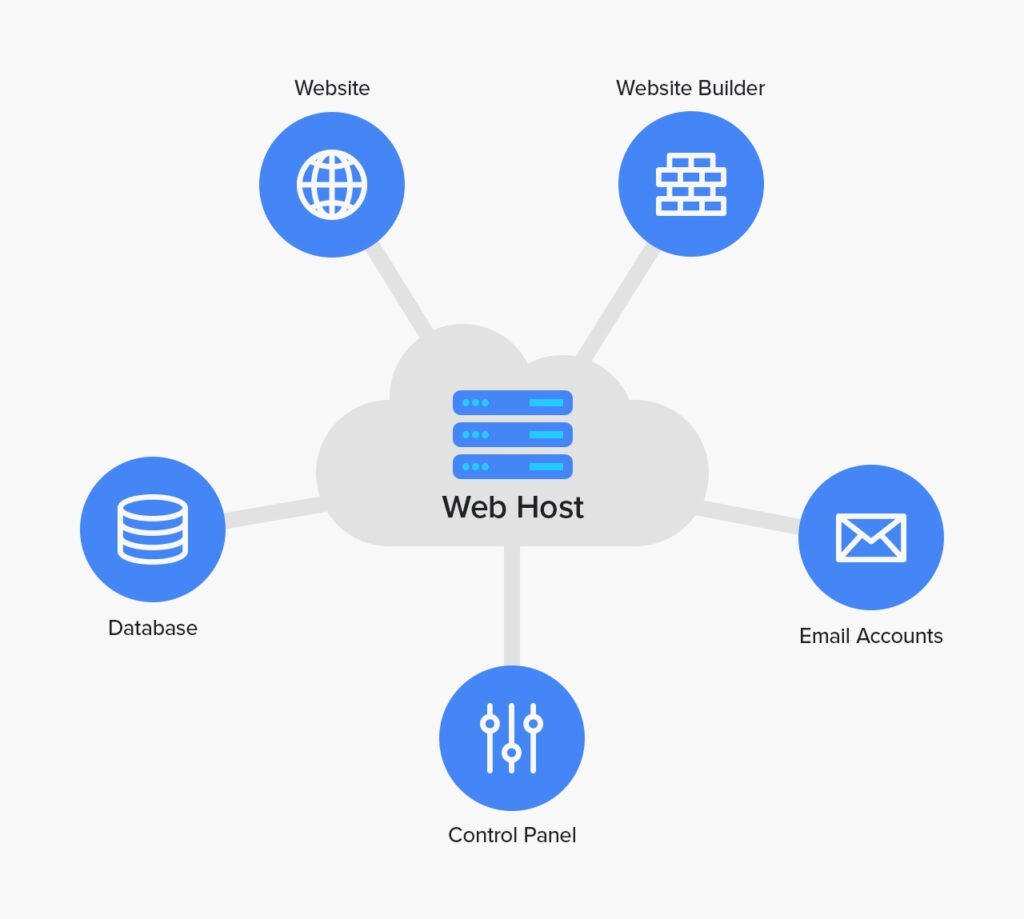Hostinger is another reputable company that you simply just cant go wrong with. I have been personally using this to host my personal, business and client websites.
Siteground was among the top 10 best web hosting companies. Siteground offers great load times, great uptime and are officially recommend by WordPress.org. A good option.
DreamHost helps you succeed on your terms. When you use DreamHost, our industry-leading resources, products, and services enable you to build your website on a solid foundation and grow it faster than you could anywhere else
Namehero provides blazing fast web hosting for businesses of all sizes backed 24x7x365 by SuperHero Support. Regardless if you’re a beginner launching your first website or an e-commerce business needing to serve hundreds of orders a day, we have a web hosting solution perfect for you!
GoDaddy is the world’s largest services platform, dedicated to small business owners around the world who we empower and champion at every turn.
Bluehost is a leading web hosting solutions company. Since our founding in 2003, Bluehost has continually innovated new ways to deliver on our mission: to empower people to fully harness the web.
Hostgator is a leading provider of web hosting, reseller hosting, VPS hosting, and dedicated servers.
In today’s digital age, a strong online presence is crucial for reaching wider audiences.
However, creating a website can be daunting for beginners.
Effective web hosting requires understanding domains, uptime, bandwidth, and data storage. Choosing the right hosting type for your business is essential.
Whether you build your site or hire a professional, selecting the best web host is critical. Learning about web hosting basics can help you make an informed decision.

We recommend Maisim Design who can create your unique website fort personal or business purposes.

Web hosting provides a digital home for your website, storing its content and enabling internet users to access it. This service utilizes servers—either physical machines or virtual environments—to house your site’s components, including text, images, videos, and other files.
A domain name serves as your website’s online identity, similar to a business name. It’s designed to be memorable, making it easy for users to find and revisit your site.
IP addresses, on the other hand, function like physical addresses for websites. Every server has at least one IP address, which is essential for internet traffic to locate your site. While domain names can change, IP addresses generally remain constant.
Many web hosts offer domain registration services, sometimes including a free domain for the first year with their hosting packages.
When selecting a web hosting plan, several factors should be considered to maximize the benefits for your online presence.
Hosting plans often limit the number of websites and email addresses per account. Basic plans may accommodate only a few, while more advanced options like VPS or dedicated hosting typically allow for multiple sites and email addresses.
However, be aware that even “unlimited” plans may have practical limitations due to bandwidth and storage constraints.
While all hosting types serve the same fundamental purpose, the server configuration can significantly impact your website’s performance. The main differences lie in how server resources are allocated to your site.
In shared hosting, multiple websites share a single server’s resources. This option is often the most affordable and widely available, making it suitable for small websites or local businesses. However, it may lead to slower load times and potential security issues as your site grows.
Virtual Private Server (VPS) hosting allocates dedicated resources to your account within a shared physical server. This offers improved reliability and security compared to shared hosting, at a moderate price increase. It’s ideal for medium-sized businesses or sites prioritizing speed.
Dedicated hosting provides an entire physical server exclusively for your website. While more expensive, it offers maximum control, performance, and security. This option is best suited for large businesses with high traffic volumes.
Cloud hosting utilizes multiple interconnected machines to power your website. This distributed approach minimizes downtime and offers scalability. Once prohibitively expensive, cloud hosting has become more accessible to smaller businesses in recent years.
Co-location involves renting space in a data center for your own server. This option provides benefits similar to dedicated hosting but at a lower cost since you own the hardware. However, you’re responsible for managing both software and hardware components.
Reseller hosting allows account owners to allocate their unused bandwidth and storage to host third-party websites. This presents an opportunity for entrepreneurs to generate additional revenue by reselling hosting services.
SSL certificates provide crucial encryption for data transmitted through your website. This security measure protects sensitive information from potential hackers, making it indispensable for e-commerce sites and any platform collecting personal data from visitors.
Website Backups
Regular backups create snapshots of your website, allowing for quick restoration in case of data loss. Many hosting providers offer automated daily backups, relieving you of this responsibility and ensuring your site’s content remains safe. When choosing a web host, inquire about their backup options to understand what’s available.
Servers require operating systems to function, with Linux being the most prevalent due to its cost-effectiveness and flexible licensing. Linux powers most servers worldwide and is the preferred choice for many hosting plans. Windows, however, offers better integration with other Microsoft tools, making it suitable for certain business needs.
Understanding web hosting fundamentals is crucial when selecting the ideal plan for your needs. The best hosting solution will balance your specific requirements with affordability and useful features. Recognizing your needs is the first step towards making an informed decision.
WordPress is an excellent platform for first-time website creators, offering user-friendly interfaces and extensive support on affordable hosting plans. It provides a robust foundation for learning web development while delivering professional-grade functionality. As your skills and business grow, WordPress can adapt to support your evolving needs.
Many shared hosting providers support WordPress installations. While this option meets the basic technical requirements for running WordPress, it may not be ideal for high-traffic sites. Shared hosting is generally recommended for small sites and blogs with moderate visitor numbers.
For larger or more complex WordPress websites, a Cloud or VPS hosting plan offers better performance than shared hosting. These options provide increased control, space, and importantly, improved bandwidth and speed to handle higher traffic volumes.
Managed hosting is an excellent choice for busy business sites, offering more than just advanced technology. It includes essential services such as security updates, site maintenance, advanced analytics, downtime tracking, and automated backups. Some managed hosting plans also provide specialized plugins to enhance overall performance and security.
Regardless of your hosting plan, there are various ways to optimize WordPress performance. Regular updates of WordPress core and plugins are crucial for security and compatibility. When selecting plugins, opt for those with large user bases and active development to ensure ongoing support and timely updates.
Always maintain proper backups of your WordPress theme files and content. This practice safeguards against unexpected issues and allows for easy restoration if problems arise. Additionally, consider hosting videos on external platforms like YouTube to conserve bandwidth and storage space on your hosting plan.
Developing a website involves complex processes that depend heavily on your chosen web hosting and server technology. While it’s possible to host a site without a web host, the intricacies of server setup often lead businesses to work with professional hosting providers for optimal security and performance.
Before selecting a web host, carefully consider your current and future hosting requirements. Factor in aspects such as anticipated traffic growth, potential need for multiple sites or subdomains, software integration needs, and the overall importance of your website to your business growth.
Web hosting is a crucial service that allows individuals and businesses to establish an online presence by making their websites accessible on the internet. Hosting providers offer the necessary infrastructure and technologies to ensure that web pages are viewable to users worldwide. When selecting a web host, it’s important to have clear expectations about the services they should deliver. These typically include reliable server uptime, adequate storage and bandwidth, security measures, and customer support. Additionally, quality hosts often provide extras such as domain registration, email hosting, and user-friendly website building tools. Understanding what to expect from your web hosting provider is essential for maintaining a successful online presence and achieving your digital goals.
Choose a web host that can grow with your business. Scalable hosting providers offer a range of plans from basic to advanced, allowing you to upgrade seamlessly as your needs evolve without migrating to a new host.
Ensure your chosen host offers robust uptime guarantees and has a track record of reliable performance. As your business grows, consistent website availability becomes increasingly critical.
Opt for hosting plans with unlimited or high bandwidth allowances. This prevents unexpected charges or service interruptions during traffic spikes.
While lower-tier plans may have storage limitations, they’re often sufficient for most business websites. As your site grows, you can upgrade to plans offering more or unlimited space.
In today’s digital landscape, a website is essential for business competitiveness. When choosing a web host, consider factors such as cost, performance, flexibility, uptime guarantees, customer support, security measures, and available features like website builders and email hosting.
Remember, selecting a web host is a long-term decision. Take the time to research thoroughly and choose a provider that aligns with your current needs and future growth plans.
Selecting an inadequate web hosting solution can lead to frequent downtime, potentially causing significant harm to your brand reputation and revenue streams. When your website is inaccessible, customers can’t engage with your content, products, or services. This not only results in lost sales opportunities but may also lead customers to question the reliability and professionalism of your brand.
Poor web hosting can negatively impact your search engine rankings. When search engine crawlers encounter a consistently unavailable or slow-loading website, they may penalize your site’s SEO performance. This can result in reduced visibility in search results, leading to fewer organic visitors and potential customers finding your site through search engines.
Insufficient security measures and subpar hosting performance can expose your website to various risks. Inadequate encryption and security protocols may leave your site vulnerable to hacking attempts, potentially compromising sensitive business and customer data. Additionally, performance issues such as slow loading times can frustrate users and damage your online reputation.
Selecting an effective web hosting service is crucial for business growth and online success. When establishing your website and searching for the ideal web host, consider these valuable tips to guide your decision-making process:
By carefully considering these factors, you’ll be better equipped to choose a web hosting service that aligns with your business goals and supports your online presence effectively.
While free hosting might seem attractive for personal projects, it’s generally unsuitable for professional business websites. Free hosting often comes with limitations on resources, functionality, and SEO capabilities, which can hinder your site’s growth and performance. Investing in quality hosting is crucial for maintaining a professional online presence.
Thorough research is essential when selecting a web hosting provider. Customer reviews offer valuable insights into the real-world experiences of other users. Pay attention to feedback regarding uptime, customer support, and overall satisfaction to make an informed decision about potential hosting services.
While budget constraints are common, especially for startups and new businesses, choosing a hosting provider solely based on price can be counterproductive. Low-cost plans may come with hidden fees or severe limitations that hinder your website’s growth. Instead, focus on finding a balance between cost and features that align with your business needs and future scalability requirements.
The importance of choosing the right web hosting service cannot be overstated. Many businesses overlook the critical role hosting plays until they experience issues that disrupt their online operations. Making informed decisions about web hosting is crucial, as the performance and stability of your hosting directly impact your online presence, customer experience, and ultimately, your business success.